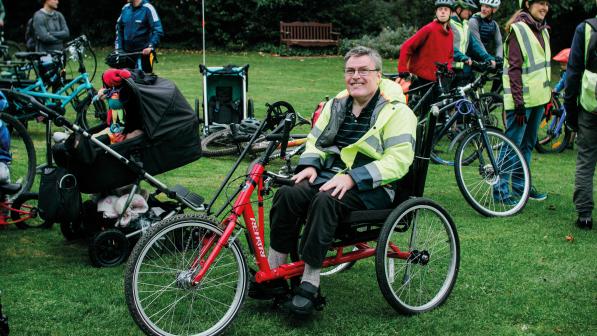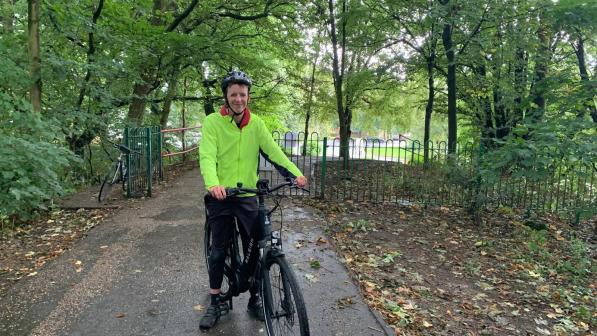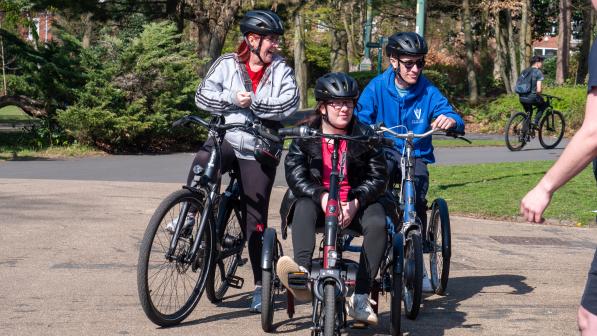How cycling gave two women independence and confidence

Alison used to ride a tandem with her husband, enjoying cycling holidays together both in the UK and across Europe. Over the years they’d travelled to Norway, Sweden, Germany, France and the Benelux countries, but in 2024, Alison’s husband sadly died and so she lost her tandem pilot.
Alison had tried tandem cycling with her brother-in-law, however it was cycling on her own that she wanted to do, but she’d always faced challenges balancing on a bike.
She’d had a trike before, so she knew it would solve that. But a long-term problem with tennis elbow meant she needed a butterfly handlebar to give her wrists and arms the right support.
Alison had not been able to find a trike with one, and didn’t want to commit to the cost of something that might not be suitable, as adapted cycles can be considerably more expensive than standard two-wheeled cycles. “I’d probably have had to sort of bite the bullet and say right, I’ll buy that,” she says.
But after hearing about Cycling UK’s Inclusive Cycling Experience she decided to give it a go. The programme, funded by the Motability Foundation, which allows disabled people to try different kinds of non-standard cycles and borrow them for an extended period, is entirely free and allows people to find what kind of bike works best for them.

Since then, cycling has given Alison another way to exercise, apart from walking, which she also does regularly. “But being able to cycle means I can go that little bit further to places like Rivington, and a bit more out into the rural environment.
Cycling isn’t just a good way of keeping fit and being out in the fresh air, but an environmentally friendly way of getting around that allows you to explore places at a pace that means you see things you might miss if you were in a car
Cycling UK Development Officer Simon Ward had even been able to find the correct handlebar for a trike so Alison could cycle comfortably.
For Lesley, meanwhile, the programme provided an opportunity to improve her mobility and regain a sense of independence. “Being able to get out and about in a safe and supportive environment is not just about movement, but about reconnecting with the world around me and building confidence along the way.”
When Lesley first heard about the Inclusive Cycling Experience online, she didn’t yet know it was going to be a turning point. She had also been an active cyclist, regularly cycling 10km on cycle paths and more in the gym, and had a brand new mountain bike gifted by a friend.

But then she had to have hip surgery, which stopped her in her tracks. “After the surgery, I hadn’t been out and about for nearly three years. I lost my confidence and my balance wasn’t great, and I genuinely thought I’d never ride again.”
Now, thanks to the project, she’s been able to reconnect with that part of her life. She was introduced to it through Stretford Public Hall, where an instructor helped her explore different types of e-cycles and eventually matched her with a trike that suited her needs.
It gave me the stability I needed, minimised pain, and most importantly, gave me the confidence and motivation to get moving again. For the first time in a long while, I felt like myself
Now in retirement, she finds that getting back out there has been an eye-opener. She’s been reminded of how good it feels to move, to explore, and she is seriously thinking about buying a trike of her own.
Lesley is still considering what type of cycle suits her best, and the flexible loans are ideal in trying to determine that. The Inclusive Cycling Experience allows people to hire a cycle for anything from one hour to a month, and there’s no limit to how many times you can take another loan, provided one is available.
A smooth test track is not the same as “navigating the hills, roads, and real-life terrain around where I live. [Through the loan] I got to experience what it’s really like to ride in my own environment, with all its ups and downs – literally!
“It gave me a much clearer picture of what I need, and what works for me. It’s not just about the specs, it’s about how it feels when you’re out there.”

For Leslie, cycling makes her feel good. “Getting into the parks, I found myself stopping to chat with people, even my postman! And that’s saying something, because normally, I’m a bit of a grumpy introvert and keep to myself. But being out there, it’s improved my mental wellbeing.”
Alison agrees: “Oh goodness, I’m doing some worthwhile exercise. I’m reducing my carbon footprint, doing my bit for that.”
She went on to share how the local cycle paths could do with improving, though there is some separated cycling infrastructure and disused railway lines not too far from where Alison lives.
Salford has many dedicated cycle lanes and some shared pavements, which help Alison get around, but Bolton has very little, and the main roads can be particularly unpleasant.
Alison has seen some of the junctions in the centre of Bolton improved recently, and near the station, there’s a useful cycle path. “There’s a cycle hub building there, for locking your cycles and everything, but then it just all stops.
“I’ve been tempted to make a notice and stick it on the floor that says, ‘Now what?’. There’s no indication where you’re meant to go from there. There’s no sign to indicate whether you’re allowed to cycle down the pedestrianised street to the Town Hall square.”
Where Leslie lives, the council has taken bold steps since the pandemic to promote cycling by expanding dedicated cycle lanes. Leslie believes it’s been a game-changer for people on bikes.
Riding in a protected lane feels not only safer but also more empowering. I've discovered so many new routes I never knew existed. It's like the city has opened up in a whole new way

Leslie has come to appreciate how important accessibility is, not just during the ride, but when arriving in places. “At a recent cycle show, I noticed how little thought had gone into access for people with mobility issues, but being able to park close by makes a huge difference.
There’s a way to make things more inclusive; simple changes like accessible entry points can open these spaces to so many more people. It says, ‘you belong here’, making everyone feel welcome
For Leslie, the difference after taking part in the Inclusive Cycling Experience has been “genuinely lifechanging”. It’s meant that she isn’t as reliant on her car, which has made everyday tasks like shopping feel lighter and more enjoyable.
“Friends used to encourage me to go for walks, but it just wasn’t possible for me to get out and go anywhere easily anymore. That’s why this has felt so brilliant. The project didn’t just help me physically; it gave me a renewed sense of possibility and independence I hadn’t felt in a long time.”
One of Leslie’s friends lives across the canal, with her allotment visible from Leslie’s home. She used to have to drive a mile and a half to go and help her with the fruit and vegetables but recently was able to take the trip by cycling across a bridge. “And I got the bonus of getting fruit and vegetables for the labour,” she adds.
“It’s not just about cycling. It’s about freedom and rediscovering joy in everyday moments. I’m incredibly grateful for the support,” Leslie affirms.


